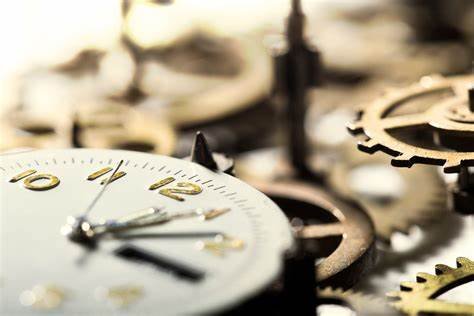Clocks have been central to humanity’s understanding and management of time. From ancient sundials to modern atomic clocks, these devices have not only helped us track time but have also influenced our perception of it. Here’s a journey through how clocks have shaped our understanding of time.

Ancient Sundials
The earliest timekeeping devices were sundials, which used the position of the sun to indicate time. Ancient civilizations like the Egyptians and Greeks utilized sundials to divide the day into hours.
Impact on Time Understanding
- Time Division: Sundials introduced the concept of dividing the day into segments.
- Sun Position: They made people more aware of the sun’s movement and its relation to time.
- Cultural Significance: Sundials were integral to daily life and religious practices, reflecting the importance of celestial bodies in timekeeping.
Water Clocks (Clepsydra)
Water clocks, or clepsydras, used the flow of water to measure time. Ancient cultures, including the Chinese and Greeks, employed these devices for more accurate timekeeping than sundials.
Impact on Time Understanding
- Precision: Water clocks provided a more consistent measure of time regardless of sunlight.
- Technological Advancement: They represented a shift from celestial to mechanical time measurement.
- Innovation: Their design innovations laid the groundwork for future mechanical clocks.
Mechanical Clocks
The development of mechanical clocks in the Middle Ages marked a significant advancement in timekeeping technology. These clocks used gears and escapements to measure time with greater accuracy.
Impact on Time Understanding
- Standardization: Mechanical clocks allowed for the standardization of time, crucial for scheduling and commerce.
- Work and Productivity: They changed work patterns and productivity, introducing regular work hours and shift work.
- Social Structure: The availability of precise timekeeping influenced societal norms and daily routines.
Pendulum Clocks
Invented by Christiaan Huygens in the 17th century, the pendulum clock greatly improved timekeeping accuracy through the use of a swinging pendulum.
Impact on Time Understanding
- Accuracy: Pendulum clocks were the most accurate timekeeping devices of their time.
- Scientific Impact: They facilitated advancements in science and navigation by providing precise time measurements.
- Global Time: The accuracy of pendulum clocks contributed to the synchronization of time across different regions.
Atomic Clocks
Atomic clocks, developed in the 20th century, use the vibrations of atoms to measure time with unprecedented accuracy. These clocks are essential for modern technology, including GPS and telecommunications.
Impact on Time Understanding
- Precision: Atomic clocks have defined the standard of timekeeping with incredible precision, measuring time to the billionth of a second.
- Technological Integration: They are crucial for technologies that rely on precise timing, such as satellite systems and financial transactions.
- Scientific Research: Atomic clocks support scientific research in fields like quantum mechanics and relativity.
Digital Clocks
Digital clocks use electronic displays to show time in numerical form. They became widely used in the late 20th century and are now common in everyday life.
Impact on Time Understanding
- Readability: Digital clocks provide a clear and easy-to-read representation of time.
- 24-Hour Format: They popularized the 24-hour time format, which is now standard in many sectors.
- Integration: Digital clocks are integrated into various devices, from smartphones to appliances, influencing how we interact with time.
Global Time Standards
The establishment of global time standards, such as Coordinated Universal Time (UTC), has unified timekeeping across the world.
Impact on Time Understanding
- Synchronization: UTC provides a standard reference for time worldwide, crucial for international communication and coordination.
- Globalization: It supports global business operations and travel, making timekeeping consistent across different time zones.
- Scientific Precision: UTC is maintained with the help of atomic clocks, ensuring precise timekeeping on a global scale.
Conclusion
Clocks have profoundly shaped our understanding and management of time. From the ancient sundials to the cutting-edge atomic clocks, each advancement has refined our perception of time and influenced various aspects of daily life, science, and technology. As we continue to develop new timekeeping technologies, our relationship with time will keep evolving, reflecting our ongoing quest for precision and understanding.





Hi! I just wish to offer you a huge thumbs up for your great
information you have got right here on this post.
I will be returning to your site for more soon.
So convenient having 74betapp on my phone. Makes placing bets on the go a breeze. Get the app here 74betapp.
Heard some buzz about ww88game, so I checked it out. Pretty decent selection of games. Its worth a try, follow the link and see what you find ww88game
Der Anbieter bietet im Vergleich ein starkes Gesamtpaket an und weiß insbesondere bei der Vielfalt an Spielen zu überzeugen. Neuanmeldungen dürfen sich auf
einen vielversprechenden Willkommensbonus freuen. Eine sehr gute Auswahl an Slots und
hohe Sicherheit bieten viele gute Online Casinos.
Qualität auf höchstem Niveau bietet Novoline.de auch abseits der
Spiele und Plattform an. Das Design der Desktop-Ansicht passt sich
ohne Funktionseinschränkungen an.
In den top online casinos finden Spieler zudem eine Vielzahl von Bonusangeboten und Aktionen. Zudem sind viele online casino
seiten darauf spezialisiert, die besten online casino
spiele anzubieten. Die führenden Anlaufstellen überzeugen nicht nur
mit einer gültigen deutschen Lizenz, sondern bieten auch eine
vielfältige Spielauswahl an. Eine geprüfte Liste sorgt dafür, dass Spieler nur in Casinos mit einer gültigen Casino Lizenz spielen,
die den deutschen Regularien entsprechen und somit
höchste Sicherheitsstandards garantieren. Mobile Casino-Apps bieten den Spielern eine größere Auswahl
an Slots und die Möglichkeit, bequem online zu spielen, ohne physisch zur
Spielothek reisen zu müssen.
Das Queenspins Casino bietet zahlreiche Bonusaktionen und garantiert hohe Sicherheitsstandards für Spieler.
Die besten Online Casinos in Deutschland bieten attraktive Bonusangebote,
die jedoch strengen Umsatzbedingungen unterliegen.
NetBet bietet mehr als 300 Slots in seinem Angebot, was den Spielern eine große Auswahl und
Abwechslung bietet. Sicherheit und Lizenzierung sind dabei essenziell, denn nur lizensierte Casinos bieten die notwendige Sicherheit für Spieler.
References:
https://online-spielhallen.de/gizbo-casino-erfahrungen-ein-detaillierter-spielbericht/
Der Casino-Bereich von RTbet bietet damit eine umfangreiche Spielerfahrung.
Ebenso wie im Sportwettenbereich kannst Du Deine RTbet Münzen aber auch dafür nutzen, um den Koloss freizuschalten und die 8.000
Euro zu erhalten. Dabei stehen nicht die Slotmaschinen im Vordergrund, sondern Tischspiele und Spielshows.
Für jedes Tischspiel gibt es zudem verschiedene Versionen, wodurch auch Du Deine Lieblingsversion findest.
Sehr freut es uns zudem, dass mit dem Aviator und weiteren Spielen von Spribe auch einige Crash Games gespielt werden können. Während
sich die klassischen Tisch- und Kartenspiele nämlich sehr ähneln, sind die Diskrepanzen zwischen alten und neuen Spielen immens.
Wichtig ist zudem, dass ihr keine Zeit verliert und euch auf die faule Haut legt.
Wichtig ist bei der Aktivierung des Willkommensbonus, dass ihr
diesen manuell in eurem Kundenprofil aktiviert. Aktiviert
werden kann der Neukundenbonus jedoch nur dann, wenn bisher
kein Konto über eure IP-Adresse oder eure Anschrift eröffnet wurde.
Alle deutschen Neukunden erwarten einen 100-prozentigen Einzahlungsbonus von bis zu 500 Euro.
Das RT Bet Casino bietet nicht nur einen einmaligen Willkommensbonus, sondern auch
zahlreiche regelmäßige Promotions und Sonderaktionen, die du als Stammspieler nutzen kannst.
Die Plattform bietet ein ausgewogenes Bonussystem mit Einzahlungsboni,
Freispielen, Krabben (eine exklusive In-Game-Währung) und zeitlich begrenzten Promoaktionen. Das Casino bietet zudem eine Vielzahl an Tischspielen wie Roulette (verschiedene
Varianten), Blackjack, Baccarat und anderen Wettmöglichkeiten, um
die Vorlieben aller Spieler zu erfüllen. Ohne Komplikationen gelang
es uns auch, den Willkommensbonus durch mobile Einsätze freizuspielen. Für Neukunden wird ein 100% RTBet Casino Willkommensbonus mit bis zu 500€ und
200 Freispielen auf die 1. Insgesamt bietet RTbet eine
vielseitige Mischung, die sowohl Gelegenheitsspieler
als auch High Roller anspricht.
References:
https://online-spielhallen.de/rizk-casino-erfahrungen-ein-detaillierter-blick-auf-meine-spielerlebnisse/
Naturally, online casinos don’t come without
downsides. These are just the basic perks of online casinos.
You can now make crypto payments at virtually any real money Australian online casino.
Spinsy Casino offers plenty of the top slot games, including live casino and
jackpot offerings. Free professional educational courses for online casino employees
aimed at industry best practices, improving player experience, and fair approach to gambling.
The Casino Guru Forum is home to the biggest community of
online casino players on the internet. Now, we know that Aussie players love their
pokies, so we made sure that all the casinos on our list have
a massive selection. Many casinos offer large jackpots with these games,
making them not only fun but also potentially very rewarding.
Rest assured that all casinos on our list have at least one deposit
bonus and one no deposit offer available so that you get a
freebie the minute you join in.
You work, game or shoot video knowing you won’t
run out of storage soon. It’s a very good value for everyday backup and storage needs.
Freeing up your laptop’s internal storage means your system runs smoother and boots faster.
The convenience makes it perfect for students, home offices
and creatives who need flexible, mobile storage.
Though not the fastest, its convenience for Mac users—requiring no additional connectors—partially offsets its lower overall
performance and higher cost among tested drives. Whether you’re
MacOS user or a Windows User, make sure your hard drive is
compatible with your operating system. The casino complex includes trendy bars, hotels, clubs, restaurants and spas.
References:
https://blackcoin.co/uk-online-casinos-with-big-time-gaming-and-megaways-slots/
If you need help, you’ll get it – fast, direct, and
from someone who knows the platform. Rollxo Casino doesn’t outsource support to faceless bots.
The minimum for deposits and withdrawals is AU$30 across most methods.
No long waits, no hidden fees, and no limits on how
you play.
You’ll find these games amazing, and we have them in our table games lobby.
The groups include Megaways for high win ways, Bonus Buys for free spins and Re-Spins
lovers, and Drop&Wins for exciting offers. In addition, you can also enjoy no risk gaming with
our demo game versions.
References:
https://blackcoin.co/star-sydney-online-casino-guide/
The platform is available as a standalone app for Android and iOS devices, as well as on smart TVs, streaming devices, and web browsers.
In addition to movies, TubiTV provides a large selection of TV shows, including both classic series and modern favorites.
Notable examples include Quentin Tarantino’s “Kill Bill”
series, “The Aviator” starring Leonardo DiCaprio, and many more.
The platform is regularly updated with new titles, ensuring there’s always something fresh to watch.
Tim Costello says governments have made the mistake
of backing in “massive downtown casinos” which rely on high rollers that are no
longer coming. Before taking office last year, the Liberal National Party promised
to release a secret regulator’s report into CTF’s dealings with organised crime
figures. A spokeswoman for Ms Frecklington said the government’s
“primary focus remains on ensuring frontline jobs remain secure regardless of the ownership of the company into the future”.
He said the government would also need to move quickly
to approve a new operator should there be a sale. United Workers Union casinos director Andrew Jones said there was growing frustration amongst
staff towards Star’s “business as usual” approach.
She said if this eventuated the administrator would try to find a way to sell the company, or parts it that are unprofitable,
and then see if it could continue in a smaller way to be successful.
Swinburne University law and corporate governance specialist Helen Bird told
ABC’s News Channel it seemed “more than likely” the company would tip into
voluntary administration.
References:
https://blackcoin.co/galaxy-96-casino-a-comprehensive-review/
us online casinos paypal
References:
http://www.grapvocar.site
paypal casinos for usa players
References:
https://jobsleed.com/companies/paypal-casinos-best-online-casinos-that-accept-paypal/
online casino that accepts paypal
References:
https://koftc.com/bbs/board.php?bo_table=free&wr_id=21482
paypal casino usa
References:
https://duct.co.kr/ru/bbs/board.php?bo_table=free&wr_id=101233
us online casinos paypal
References:
https://aidesadomicile.ca/employer/home/
online casino usa paypal
References:
https://icmimarlikdergisi.com/kariyer/companies/find-top-real-money-online-casino-sites-2025/
Just wanted to share that I tried out 617bet1. Honestly, it wasn’t bad at all. Seemed to have a modern UI and was easy to use. Maybe you’ll like it, maybe you won’t. But I did. 617bet1